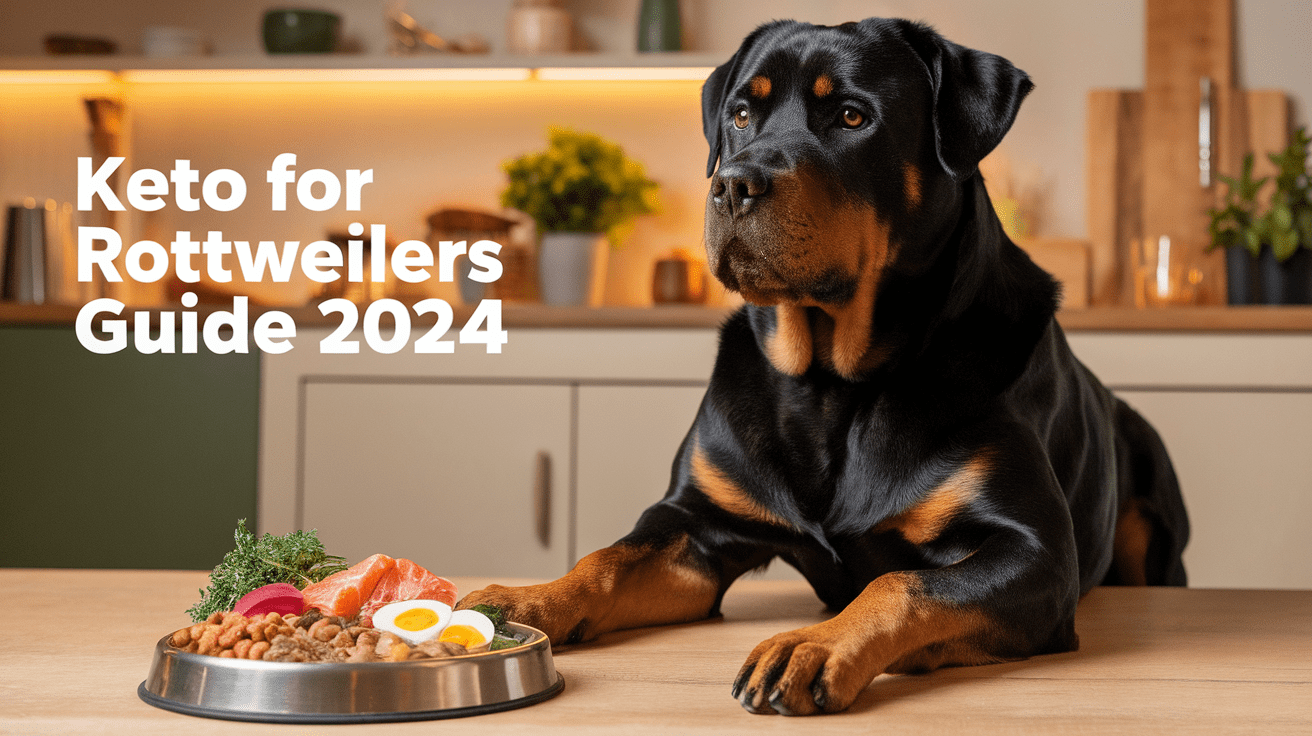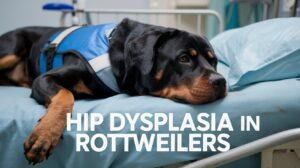Key Takeaways: Keto Diet for Rottweilers
- ✓ Natural Diet Alignment: Ketogenic diets closely match dogs’ ancestral eating patterns, focusing on high fat and moderate protein content with minimal carbohydrates.
- ✓ Health Benefits: Proper keto diets can improve weight management, reduce inflammation, enhance coat quality, and provide stable energy levels.
- ✓ Careful Transition: Switching to a keto diet requires a gradual 2-3 week transition period and close monitoring of your dog’s health.
- ✓ Professional Guidance: Veterinary supervision is essential for successful implementation and maintaining proper nutrient balance.
Is a keto diet right for your beloved Rottweiler? As a veterinarian and long-time Rottweiler owner, I’ve seen firsthand how proper nutrition can transform our four-legged friends’ health. According to a 2018 study in Research in Veterinary Science, low-carb diets can significantly improve weight management and energy levels in large breed dogs.
While ketogenic diets have gained popularity among humans, their application in canine nutrition raises intriguing questions, especially for powerful breeds like Rottweilers. Think about it: before commercial dog food existed, our dogs’ ancestors thrived on a diet primarily composed of meat and fat. Could returning to these nutritional roots benefit your Rottweiler?
In this comprehensive guide, we’ll explore the science behind canine ketosis, weigh the potential benefits and risks, and provide practical steps for safely transitioning your Rottweiler to a keto diet. Let’s dive into what you need to know about this increasingly popular feeding approach.
Understanding the Basics of Keto Diet for Rottweilers
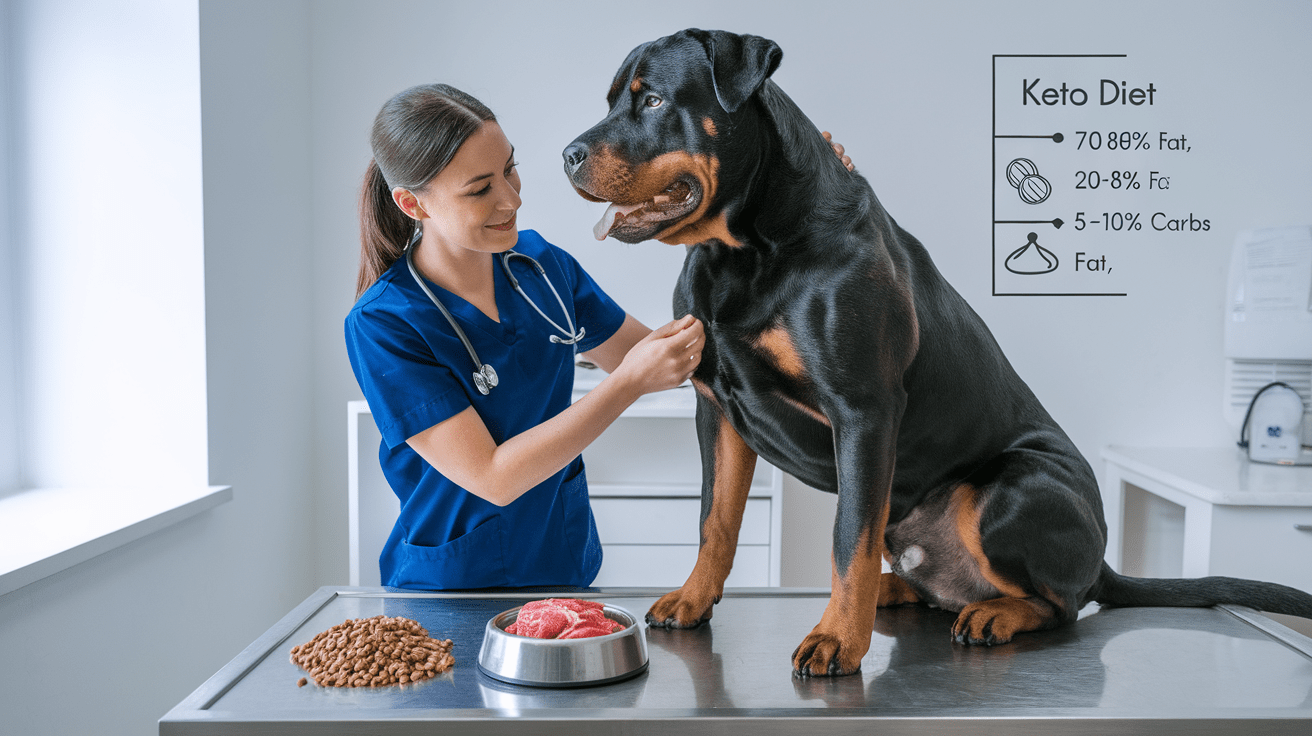
What is a Ketogenic Diet?
A ketogenic diet is a high-fat, moderate-protein, and very low-carbohydrate feeding approach. In my veterinary practice, I often explain it to Rottweiler owners using this simple analogy: imagine your dog’s body as a hybrid car that can run on either gasoline (carbs) or electricity (fat). When we drastically reduce carbs, the body switches to burning fat for energy, much like switching to electric mode.
According to a 2021 study in Frontiers in Veterinary Science, dogs can efficiently utilize ketones as an alternative energy source, similar to their wolf ancestors. The key difference between traditional dog food and a keto diet lies in the macronutrient ratio:
• 70-80% calories from fat
• 20-25% from protein
• 5-10% from carbohydrates
Natural Carnivorous Diet vs Modern Dog Food
In my years treating Rottweilers, I’ve observed a fascinating pattern: many health issues stem from the mismatch between their natural dietary needs and modern commercial foods. Think about this: when was the last time you saw a wolf cooking rice or harvesting potatoes? Our Rotties’ digestive systems are designed for processing meat, fat, and organs.
I remember treating Max, a overweight Rottweiler struggling with joint issues. His transformation on a species-appropriate, low-carb diet was remarkable. Within months, his energy levels improved, and his joint mobility increased significantly.
How Ketosis Works in Dogs
Ketosis is a natural metabolic state where your Rottweiler’s body becomes extremely efficient at burning fat for energy. When carbohydrate intake is restricted, the liver converts fat into ketone bodies, which serve as an excellent energy source for the brain, muscles, and other organs.
Unlike humans, dogs can enter ketosis relatively quickly – usually within 2-3 days of carb restriction. This efficiency comes from their evolutionary adaptation to periods of feast and famine. However, it’s crucial to note that transitioning to a keto diet requires careful monitoring and guidance from your veterinarian to ensure your Rottweiler’s unique nutritional needs are met.
Benefits and Risks of Keto Diet for Rottweilers
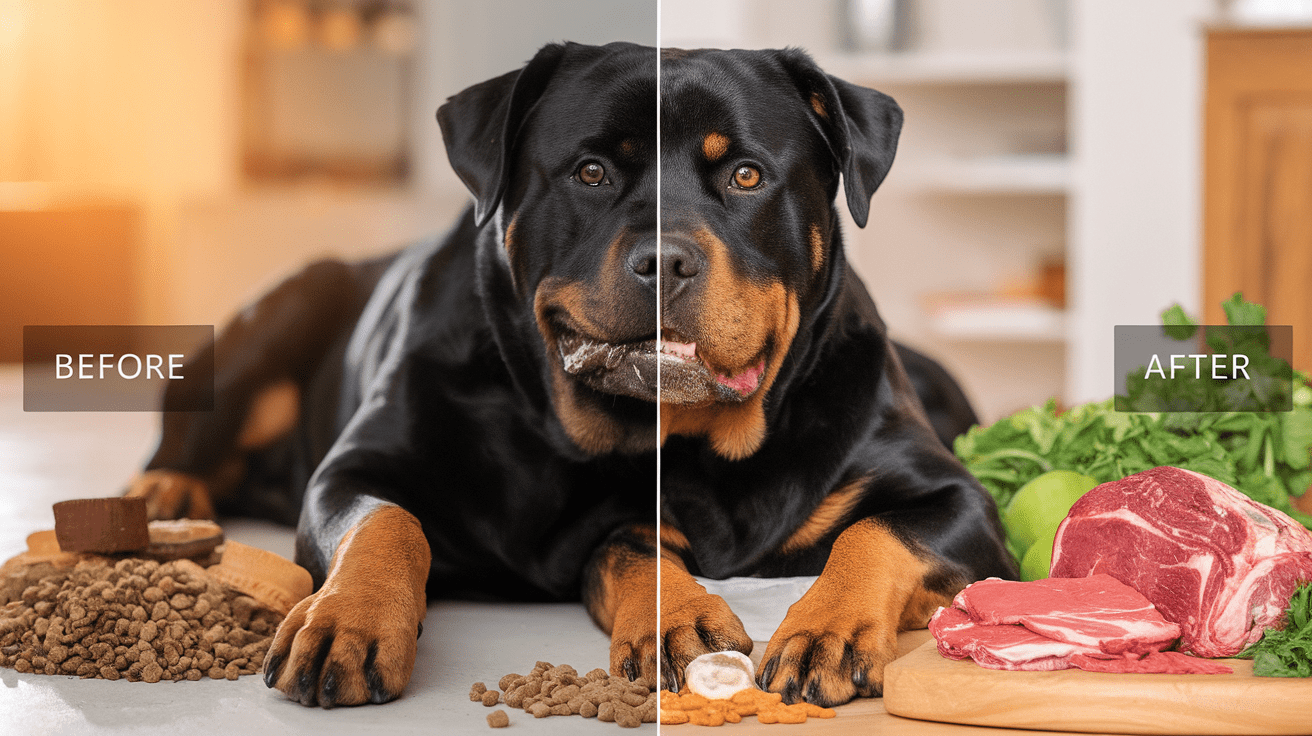
Potential Health Benefits for Rottweilers
Through years of clinical practice, I’ve witnessed remarkable improvements in Rottweilers following a properly managed ketogenic diet. According to a 2020 study in Veterinary Sciences, dogs on low-carb diets showed significant improvements in metabolic health markers and inflammation levels.
Key benefits I’ve observed include:
• Reduced inflammation and joint pain
• Better coat quality and skin health
• Improved dental health
• More stable energy levels throughout the day
I remember treating Luna, a 6-year-old Rottweiler with recurring skin issues. After transitioning to a ketogenic diet, her persistent hot spots cleared up within weeks, and her energy levels became more consistent.
Common Concerns and Side Effects
While the benefits can be impressive, it’s crucial to understand potential risks. Think of transitioning to a keto diet like changing your car’s fuel type – it requires careful consideration and monitoring. Some Rottweilers may experience:
Initial side effects:
• Temporary lethargy during adaptation
• Digestive adjustments
• Possible dehydration if not properly managed
Long-term considerations require careful attention to nutrient balance and regular health monitoring. Always work with a veterinarian familiar with ketogenic diets to avoid potential nutritional deficiencies.
Weight Management and Energy Levels
One of the most dramatic benefits I’ve seen is improved weight management. Rottweilers, being prone to weight issues, often respond exceptionally well to a low-carb approach. The stable blood sugar levels help prevent the energy crashes common with high-carb diets.
Consider this: when your Rottweiler eats a high-carb meal, their energy spikes and crashes like a roller coaster. On a ketogenic diet, their energy flow becomes more like a steady stream, supporting their natural activity patterns throughout the day.
However, it’s essential to remember that every Rottweiler is unique. What works brilliantly for one might need adjustment for another. Regular monitoring of weight, energy levels, and overall health is crucial for success on a ketogenic diet.
Implementing a Keto Diet for Your Rottweiler
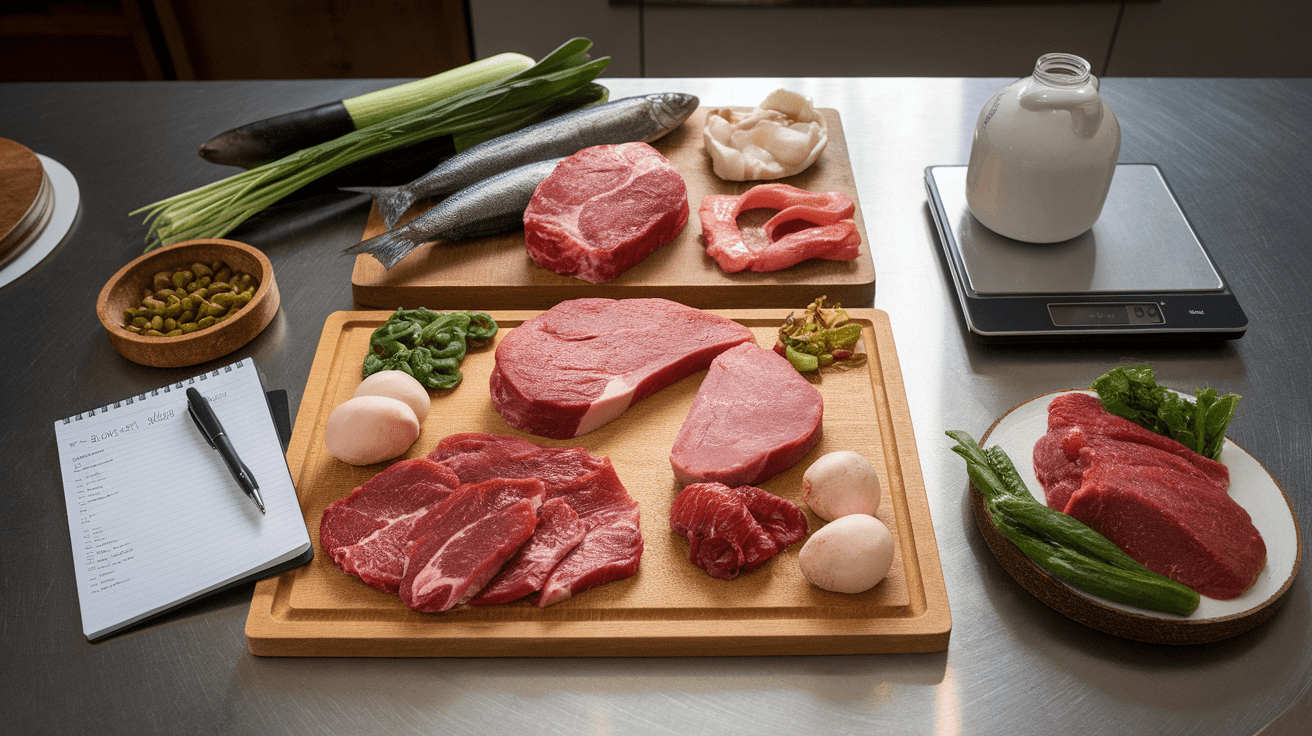
Based on extensive clinical experience, I recommend focusing on nutrient-dense, species-appropriate foods. According to a 2022 study in Veterinary Research, Rottweilers maintain optimal health when their diet consists primarily of high-quality animal proteins and healthy fats.
Recommended food choices include:
• Lean meats (beef, chicken, turkey)
• Fatty fish (salmon, sardines)
• Organ meats (liver, heart)
• Healthy fats (coconut oil, fish oil)
• Limited low-carb vegetables
Remember this analogy: building your Rottweiler’s keto meal is like constructing a house – protein forms the foundation, fats are the walls and roof, and vegetables are the finishing touches. Each component plays a vital role in your dog’s health.
Transitioning Your Rottweiler to Keto
The transition to a ketogenic diet requires patience and careful monitoring. I always tell my clients it’s like teaching their dog a new language – it takes time and consistency. Start with a gradual transition over 2-3 weeks to avoid digestive upset.
One success story that stands out is Bear, a 4-year-old Rottweiler who struggled with chronic digestive issues. We implemented a slow transition plan:
• Week 1: 25% keto / 75% original diet
• Week 2: 50% keto / 50% original diet
• Week 3: 75% keto / 25% original diet
• Week 4: Full keto diet
Monitoring Your Dog’s Health and Progress
As your Rottweiler adapts to their new ketogenic lifestyle, regular monitoring is crucial. Keep track of:
• Energy levels and behavior changes
• Weight and body condition
• Stool quality and consistency
• Water intake
I recommend maintaining a daily log during the transition period. Think of it as your Rottweiler’s personal health diary. This information becomes invaluable during check-ups and helps us make necessary adjustments to optimize their diet.
Remember, success on a keto diet isn’t just about following a formula – it’s about understanding your individual Rottweiler’s response and needs. Regular veterinary check-ups are essential to ensure your dog thrives on this dietary approach.
Frequently Asked Questions About Keto Diet for Rottweilers
Conclusion
Transitioning your Rottweiler to a ketogenic diet can be a transformative journey when done correctly. As both a veterinarian and Rottweiler owner, I’ve witnessed remarkable improvements in dogs’ health through this dietary approach. However, it’s crucial to remember that every dog is unique, and what works for one may not work for another. Before making any significant dietary changes, always consult with your veterinarian to create a personalized nutrition plan that considers your Rottweiler’s specific health needs, age, and activity level. With proper guidance, careful monitoring, and patience during the transition, a ketogenic diet could be the key to unlocking your Rottweiler’s optimal health and vitality. Remember, the goal isn’t just to change their diet – it’s to enhance their quality of life through species-appropriate nutrition.
While a ketogenic diet can significantly impact your Rottweiler’s health, it’s essential to understand your breed’s overall health needs and predispositions. For a comprehensive overview of Rottweiler health concerns and preventative measures, check out our detailed Rottweiler Health 101 Guide. Understanding these fundamental health aspects will help you make more informed decisions about your dog’s dietary needs and ensure a holistic approach to their well-being.


